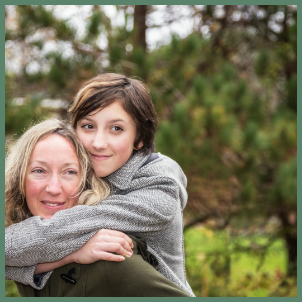THE ENERGY OF EMOTIONS
As a parent of a child with challenges, I have encountered “low energy” emotions over various points in time in my life that were particularly daunting and emotionally overwhelming. In time, I learned to transcend those difficult feelings and low energy emotions. One of them was and still can be a feeling of isolation.
It can be an incredibly lonely journey when dealing with the unique situations that come with parenting a child who has challenges. The constant demands of caregiving and the need to provide extra support and attention to my child with challenges often left me with little time or energy to engage in social activities or maintain existing relationships. As a result, I often felt disconnected from my friends, extended family, and even my partner, compounding the sense of isolation.
I have always found that connecting with other parents who face similar challenges is invaluable. In a supportive community, you can exchange ideas, strategies, and resources and can be a catalyst for change. When parents can exchange advice, offer a listening ear, and celebrate each other’s triumphs and milestones, no matter how small they might seem to others, these “higher energy” emotions create a oneness across the void of disconnection to transcend difficult times.
In an effort to cope with my emotions and reach out to others facing similar struggles, I decided to share my feelings and emotions openly. By speaking honestly about my experiences, I aim to let fellow parents of children with challenges know that they are not alone in their journey. I wanted them to find solace in the fact that there are others who understand the rollercoaster of emotions they go through on a daily basis. Even if you are physically alone, know that our connection as parents of children with challenges can raise your energy of emotions to transcend isolation.
Maybe what I’ve shared so far is resonating with you. And you are willing to explore more about how you are feeling right now. A great place to start is to see where you land on the Happiness Continuum. By knowing this, you can learn how to raise your emotional energy! Take the free, private quiz now and see for yourself. And don’t worry, no one else can see your results, it is completely private.
LOW ENERGY EMOTION
As a parent of a child with challenges, there are some emotions that may be considered “low energy” emotions – shame, grief, guilt, and fear being prominent examples. While these emotions are a natural part of the human experience, they can have a significant impact on our well-being if not properly acknowledged. I want to explore each of these “low energy” emotions, understand their underlying causes, and delve into how they can affect our health and well-being over time. Long-term exposure to cortisol from fear, stress and anxiety can contribute to significant health problems in your own life, so we want to improve how you’re processing emotions to keep you well and healthy. Most of all, I want to touch upon effective strategies to help you rise above these emotions, promoting emotional resilience and overall well-being.
GUILT
Guilt is a complex emotion that arises from a sense of responsibility for an action or inaction that may have caused harm or disappointment to oneself or others. For me, some days I see the suffering he goes through for things others his age take for granted. So often I would think to myself, “Was it something I did? or something I didn’t do? Am I trying hard enough to help him? Should I be doing more or something different?”.

While guilt can serve as a moral compass, excessive and unresolved guilt can be detrimental. It can lead to self-punishment, anxiety, and feelings of worthlessness.
Disabilities, differences, and challenges for our child can result from many factors such as, environmental influences, and chance occurrences during early development. Medical professionals assure parents that these conditions are not within anyone’s control. They are not caused by any actions or decisions made during pregnancy, childbirth, or parenting.

Recognize that some situations may be beyond your control. Release what is beyond your control. Dwelling on guilt over things you cannot change will only perpetuate the pain. Focus on what you can do now and how you can make positive changes moving forward. Transition responsibility for life decisions to your child when possible to remove co-dependency. Try to come to terms with the fact that it is their journey, their life. You should have one too.
GRIEF
Grief is a profound emotion experienced after a loss… What was to be the future life for your child, your dreams for your child? The friends they would make at school, the sports they would play, going to college, getting married. Not to say these things still won’t happen, but the landscape of your child’s future has changed, and has moved into the zone of the unknown.

The grieving process can encompass a range of emotions, including sadness, anger, and guilt. Unresolved grief can lead to prolonged periods of depression, emotional numbness, and difficulty finding joy in life.
Grief is a natural response to a major life change, the loss of what was pictured in your mind for your child and your life with your child. The biggest challenge for me was what to replace my expectations with… There was no book on the shelf for me to ponder options. Just the black hole of what seemed like senseless, idealistic expectations my child probably couldn’t reach.

Give yourself permission to grieve and acknowledge your emotions. Reach out to a support network, or join the Grow Your Happy Membership to connect with other parents to process your emotions. Find activities for you and your child to find joy in together. Remember that you can’t control the future but with healing and pause, you can gain agency over your life to better support your child.
SHAME
Shame is an intense feeling of inadequacy, unworthiness, or humiliation arising from an inner belief of being flawed or fundamentally bad. First I felt this way about myself, what was wrong with me? The second feeling of shame I felt was for my child being different.

Shame can easily lead to a cycle of negative thoughts. Shame can manifest as anxiety, depression, and social withdrawal.
As parents, it often stems from internalizing negative judgments, criticism, or social stigmas we learn as we grow up and in various social settings about differences, disabilities, and challenges. Shame can not only corrode a parent’s self-esteem but also their child’s self-esteem. As a society, we need to learn to transcend these old belief systems and understand that differences, disabilities and challenges are a part of the natural human condition.

To combat shame, it’s crucial to practice self-compassion and challenge negative self-talk. Seek support from loved ones to process and release these feelings in a safe and non-judgmental environment to empower you to find new ways of thinking. Try not to waste your energy on what you may believe other people are thinking about you and your child. Instead, use your energy to create your own reality.
FEAR
Fear is an instinctive emotion, hardwired into our biology as a survival mechanism. It serves to protect us from perceived threats and dangers, triggering the body’s fright-or-flight response to mobilize energy and prepare for self-preservation. In its most basic form, fear can be a life-saving force, keeping us away from harm’s way.

While fear can serve as a safety feature, it is essential to recognize that fear can have a powerful impact on our health and well-being.
However, when fear becomes chronic or overwhelming, it can have detrimental effects on our health and well-being. Persistent fear can hijack our thoughts, impede decision-making, and lead to heightened anxiety and stress. In such instances, fear may no longer be serving its protective purpose, but instead, it becomes a barrier to personal growth and emotional stability.

Embracing positive practices such as mindfulness, deep breathing to physiologically calm your system, or try yoga or other physical activity. Seek support from others or join the Grow Your Happy Membership so you can take steps towards transcending fear and living a more fulfilling life.
Find out where you fall on the happiness continuum , it’s never too late to raise your emotional energy! Join the membership, there’s one month free!!

Optimism and Happiness is Teachable, Obtainable and Builds Resilience
MORE on FEAR and the STRESS HORMONE CORTISOL
Fear often intertwines with other “low energy” emotions, amplifying their impact on a parent’s health and well-being. Fear, stress and anxiety are natural responses to the challenges of parenting any child. But while we work to let go of the things that we can’t control with our child’s special needs, we cannot always “let go” of what is happening with our child and therefore our emotions. Parents of children with challenges are more likely to have prolonged exposure to fear, stress, and anxiety which can significantly impact their health and well-being.
Understanding cortisol, the body’s primary stress hormone, it is important to highlight how its presence in the bloodstream in parenting-related stress can influence overall health and well-being in life. Cortisol, often referred to as the “stress hormone,” is a vital component of the body’s stress response system. Cortisol is produced by the adrenal glands and plays a crucial role in regulating various physiological processes, including metabolism, immune function, and the body’s response to stress. When the brain perceives a threat or stressful situation, the hypothalamus triggers the release of cortisol, preparing the body for the “fight-or-flight” response.
While cortisol is essential for the body’s response to stress, prolonged or chronic stress can lead to consistently elevated cortisol levels. This continuous exposure to cortisol can have adverse effects on health and well-being. Elevated cortisol levels can suppress the immune system, can lead to sleep disturbances, increased risk of cardiovascular problems, and imbalances such as anxiety, irritability, and feelings of overwhelm.
It is essential to take on effective coping strategies to manage stress, fear, and anxiety. I know it is easier said than done. Here are some suggestions that I have used and have recommended to other parents to transcend from low-energy emotions and higher-energy emotions:
Self-Care: Prioritize self-care activities that promote relaxation and well-being, such as exercise, meditation, and spending time doing enjoyable activities. Savor them when you’re doing them.
Seek Support: Connect with other parents or seek professional help to share experiences, gain insights, and receive guidance on managing stress. Help someone else who is struggling.
Set Realistic Expectations: Understand that this journey is filled with ups and downs, and it’s okay to make mistakes. Set realistic expectations for yourself and be gentle with yourself when things don’t go as planned. Practice forgiving yourself.
Communicate and Share: Openly communicate with your partner or a trusted friend about your fears and concerns. Sharing the burden can provide an emotional release and strengthen connections. Have loving-kindness toward yourself and others.
Time Management: Organize your time effectively to balance your responsibilities for your child with personal needs and interests. Practice self-compassion to increase your well-being.
Low-energy emotions are natural aspects of being human. The key to navigating these emotions lies in recognizing and validating them, seeking support when you need it, and using healthy coping strategies. By identifying low energy emotions, you can pause and choose to replace them with higher energy emotions and thoughts. For it is within the pause that you gain agency over your own life, and have the power to choose how you want to feel as you move foward. Prioritizing health and well-being is not only beneficial for you as a parent in the long run but also essential for fostering a nurturing and loving environment for your child.



